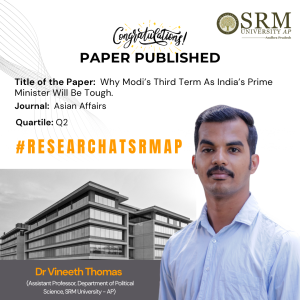 Dr Vineeth Thomas, an Assistant Professor in the Department of Political Science, has recently published a thought-provoking paper titled “Why Modi’s Third Term as India’s Prime Minister Will Be Tough” in the distinguished journal Asian Affairs. In his comprehensive analysis, Dr Vineeth delves into the political landscape of India and the various challenges Prime Minister Narendra Modi may face if he seeks re-election for a third consecutive term in 2024. Drawing on an array of political theories and current socio-economic indicators, the paper examines the underlying factors shaping Indian politics and public sentiment.
Dr Vineeth Thomas, an Assistant Professor in the Department of Political Science, has recently published a thought-provoking paper titled “Why Modi’s Third Term as India’s Prime Minister Will Be Tough” in the distinguished journal Asian Affairs. In his comprehensive analysis, Dr Vineeth delves into the political landscape of India and the various challenges Prime Minister Narendra Modi may face if he seeks re-election for a third consecutive term in 2024. Drawing on an array of political theories and current socio-economic indicators, the paper examines the underlying factors shaping Indian politics and public sentiment.
Dr Thomas argues that while Modi’s leadership has been marked by significant economic reforms and a robust foreign policy, the landscape is shifting in a manner that could complicate his re-election bid. Key issues explored in the paper include rising economic disparities, increasing urban unrest, and the challenge of maintaining communal harmony in a diversely populated nation.
The findings of this research are particularly pertinent in light of ongoing debates surrounding economic policy, agrarian distress, and the role of civil liberties – a backdrop that could significantly influence electoral dynamics heading into 2024.
The publication of this paper not only highlights Dr Thomas’s expertise in political science but also underscores the vital role academic discourse plays in contemporary political analysis. His insights contribute to a deeper understanding of India’s complex interplay between governance and public perception.
Abstract of the Research
On 9 June 2024, Narendra Modi became India’s Prime Minister for a third consecutive term, a feat previously accomplished only by Jawaharlal Nehru. However, this historic victory also began one of the most uncertain periods of his prime ministership. The fractured outcome of India’s 18th general election has created a fundamentally different political landscape. Modi’s Bharatiya Janata Party (BJP) secured just 240 seats, a significant drop from its 2019 tally, and was therefore short of an absolute majority. Although the BJP-led National Democratic Alliance (NDA) did win a majority, Modi will now be dependent upon coalition partners, necessitating a shift towards a more collaborative governance style.
Research in Layperson’s Terms
In the recent election, Modi’s party, the BJP, won only 240 seats, much fewer than in the last election and not enough for a clear majority. Although the broader alliance led by the BJP still has a majority, Modi now needs to rely more on other parties in the alliance to govern. This means he will have to work more closely with his coalition partners and be more collaborative in his leadership style.
Research Paper in the Citation Format
Vineeth Thomas, Agney GK & Arsha V Sathyan (2024), Why Modi’s Third Term As India’s Prime Minister Will Be Tough, Asian Affairs, ISSN: 0306-8374
(Routledge, SCOPUS/WoS Indexed)
Practical implementation or the social implications associated with Research
The practical implementation of my research lies in shaping policies that promote gender equality in political representation. By identifying barriers and proposing solutions, it aims to enhance women’s participation in politics, leading to more inclusive governance. The social implications include fostering a more equitable society with diverse perspectives in decision-making.
Your collaborations
Electoral Politics
Your Future Research Plans
Indian govt and politics

